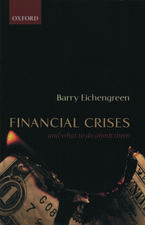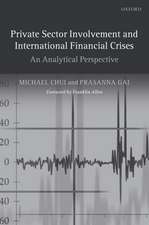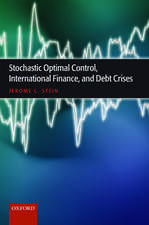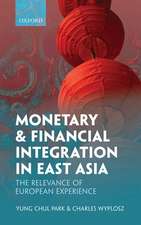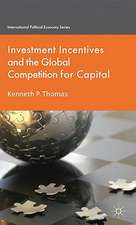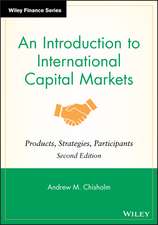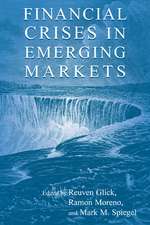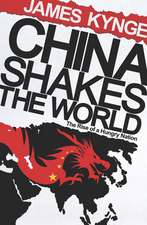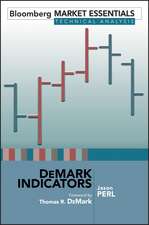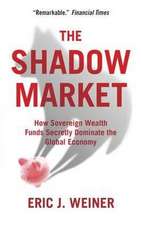Financial Crises: Lessons from the Past, Preparation for the Future: World Bank/IMF/Brookings Emerging Markets
Editat de Gerard Caprio, James A. Hanson, Robert E. Litanen Limba Engleză Paperback – 6 dec 2005
Throughout the 1990s, numerous financial crises rocked the world financial sector. The Asian bubble burst, for example; Argentina and Brazil suffered currency crises; and the post-Soviet economy bottomed out in Russia. In Financial Crises, a distinguished group of economists and policy analysts examine and draw lessons from attempts to recover from past crises. They also consider some potential hazards facing the world economy in the 21st century and discuss ways to avoid them and minimize the severity of any future downturn. This important new volume emerges from the seventh annual conference on emerging markets finance, cosponsored and organized by the World Bank and the Brookings Institution. In the book, noted experts address the following questions: How effective were post-crisis policies in Latin America, Eastern Europe, and East and Central Asia? Where do international financial markets stand ten years after the worldwide debt crisis? How can the provision of financial services resume vigorously, yet safely? What are the viable policy options for reducing systemic financial vulnerability? What will the next emerging-market financial crisis look like? Will lessons learned from past experiences help to avoid future disasters? How can nations reform their pension systems to deal with retirement challenges in the 21st century?
Preț: 354.44 lei
Nou
Puncte Express: 532
Preț estimativ în valută:
67.84€ • 73.72$ • 57.03£
67.84€ • 73.72$ • 57.03£
Carte tipărită la comandă
Livrare economică 21 aprilie-05 mai
Preluare comenzi: 021 569.72.76
Specificații
ISBN-13: 9780815712893
ISBN-10: 0815712898
Pagini: 291
Ilustrații: black & white illustrations
Dimensiuni: 152 x 229 x 17 mm
Greutate: 0.4 kg
Editura: Brookings Institution Press
Colecția Brookings Institution Press
Seria World Bank/IMF/Brookings Emerging Markets
Locul publicării:United States
ISBN-10: 0815712898
Pagini: 291
Ilustrații: black & white illustrations
Dimensiuni: 152 x 229 x 17 mm
Greutate: 0.4 kg
Editura: Brookings Institution Press
Colecția Brookings Institution Press
Seria World Bank/IMF/Brookings Emerging Markets
Locul publicării:United States
Notă biografică
Gerard Caprio is director of the Operations Policy Department in the World Bank's Financial Sector Presidency. James A. Hanson is a senior adviser to the World Bank's Financial Sector Operations and Policy Department. Robert E. Litan is a senior fellow in Economic Studies at the Brookings Institution and vice president for research and policy at the Kauffman Foundation. Among his many books is Good Capitalism, Bad Capitalism, and the Economics of Growth and Prosperity (Yale University Press, 2007), written with William J. Baumol and Carl J. Schramm.
Descriere
A Brookings Institution Press and World Bank Group publication
Throughout the 1990s, numerous financial crises rocked the world financial sector. The Asian bubble burst, for example; Argentina and Brazil suffered currency crises; and the post-Soviet economy bottomed out in Russia. In Financial Crises, a distinguished group of economists and policy analysts examine and draw lessons from attempts to recover from past crises. They also consider some potential hazards facing the world economy in the 21st century and discuss ways to avoid them and minimize the severity of any future downturn.
This important new volume emerges from the seventh annual conference on emerging markets finance, cosponsored and organized by the World Bank and the Brookings Institution. In the book, noted experts address the following questions:
How effective were post-crisis policies in Latin America, Eastern Europe, and East and Central Asia?
Where do international financial markets stand ten years after the worldwide debt crisis?
How can the provision of financial services resume vigorously, yet safely?
What are the viable policy options for reducing systemic financial vulnerability?
What will the next emerging-market financial crisis look like? Will lessons learned from past experiences help to avoid future disasters?
How can nations reform their pension systems to deal with retirement challenges in the 21st century?
Throughout the 1990s, numerous financial crises rocked the world financial sector. The Asian bubble burst, for example; Argentina and Brazil suffered currency crises; and the post-Soviet economy bottomed out in Russia. In Financial Crises, a distinguished group of economists and policy analysts examine and draw lessons from attempts to recover from past crises. They also consider some potential hazards facing the world economy in the 21st century and discuss ways to avoid them and minimize the severity of any future downturn.
This important new volume emerges from the seventh annual conference on emerging markets finance, cosponsored and organized by the World Bank and the Brookings Institution. In the book, noted experts address the following questions:
How effective were post-crisis policies in Latin America, Eastern Europe, and East and Central Asia?
Where do international financial markets stand ten years after the worldwide debt crisis?
How can the provision of financial services resume vigorously, yet safely?
What are the viable policy options for reducing systemic financial vulnerability?
What will the next emerging-market financial crisis look like? Will lessons learned from past experiences help to avoid future disasters?
How can nations reform their pension systems to deal with retirement challenges in the 21st century?



